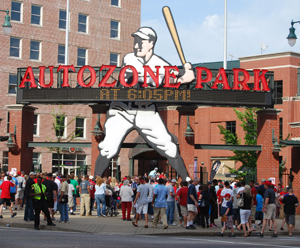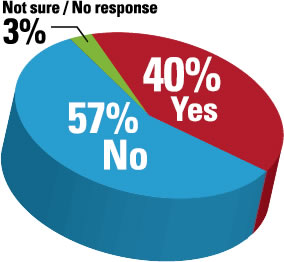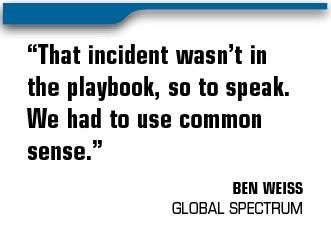AutoZone Park had its biggest game of the year under way last summer when shots were fired across the street at the DoubleTree Hotel, killing a Memphis police officer and a civilian.
Suddenly, the ballpark’s emergency training was put to the test.
“That incident wasn’t in the playbook, so to speak,” said Ben Weiss, Global Spectrum’s general manager at AutoZone Park. “We had to use common sense.”
 |
A shooting incident across from AutoZone Park forced the facility to go into lockdown mode.
Photo by: Memphis Redbirds |
It was Saturday, July 3, Fireworks Night at the home of the Class AAA Memphis Redbirds. For the club, the holiday promotion typically produces the highest revenue of any single game. More than 13,000 fans bought tickets, 6,000 more than the Redbirds averaged in 2011.
The game started late due to a 37-minute weather delay. Fans were still buying tickets and moving through the gates at 7 p.m., about the time a domestic dispute at the hotel turned deadly.
“We still had a ton of patrons coming in,” Weiss said.
With one of the city’s busiest intersections in chaos and police and other emergency vehicles zooming in from all directions, stadium officials put the ballpark in lockdown mode. Nobody was allowed to leave the facility.
Nobody else was hurt in the shootings. The quick response by Global Spectrum and Andy Frain Services, the park’s security firm, impressed local authorities. Both firms will speak to the lessons they learned at the local FBI branch’s quarterly meeting in December.
The game itself “went off without a hitch,” said Steve Zito, the Memphis-based president of Andy Frain’s sports and entertainment group.
On the night in question, the stadium’s box office crew heard gunshots and saw police converging on the hotel. Hotel
staff alerted an officer directing traffic for the Redbirds game that there had been a shooting there, according to local reports.
In turn, police told ballpark management there was an “active shooter” in the area, Weiss said. Global Spectrum, together with Andy Frain, quickly closed the main gate, the one closest to the DoubleTree, where 90 percent of fans enter the park.
Down the street, farther from the hotel, ballpark personnel opened an auxiliary gate to usher fans and other bystanders into the park while keeping a close eye on where they were coming from.
Turnkey Sports Poll Q: Do you think game-day staff at most venues hosting sporting events could effectively direct/manage an emergency evacuation of the facility?  Source: Turnkey Sports Poll, October 2011. The survey, conducted by Turnkey Sports & Entertainment in conjunction with Sports- Business Journal, covers more than 1,110 senior-level sports industry executives spanning professional and college sports. |
About 200 of those individuals were waiting in line to buy tickets or simply passing by the stadium. They were directed to the lobby of the Redbirds’ office building next to the ballpark.
Inside the main gate, a large plaza serves as a fan destination. Stadium personnel told everybody congregated on the plaza about the potentially dangerous situation and to move away from that open space.
“We didn’t know what the true story was other than there was a person with a gun,” Weiss said. “We pushed people as far into the stadium as possible. We weren’t asking questions, we were just getting people out of the way. We acted on the side of caution.”
Communication between Global Spectrum, Andy Frain and law enforcement was key. The preseason training that game-day employees go through for dealing with emergency situations helped all personnel remain calm throughout the incident, Weiss said.
After the shootings, Zito was on the phone with his regional manager at the park, Rufus Organ. Andy Frain maintained constant communication with police, and its supervisors and staff of 50 to 60 part-timers reassured fans they were safe, Zito said.
About 45 minutes after the shooting, and after police apprehended the suspected shooter, the main gate was reopened and ballpark operations returned to normal, Weiss said.






